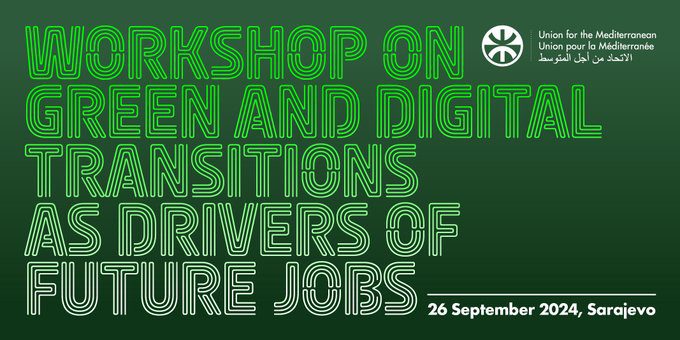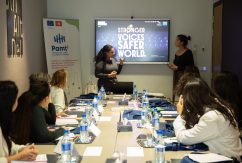Workshop on Green & Digital Transitions driving future jobs, Union for the Mediterranean

The uncertainty and volatility caused by the recent macroeconomic, geopolitical, and environmental disruptions are making it increasingly difficult for governments and businesses to make informed decisions regarding future jobs, skills, business models and workforce strategies. Green and digital transitions and Generative Artificial Intelligence are among the megatrends that are frequently cited as potential drivers of growth, whereas concerns about insufficient and/or inadequate career guidance and skilling strategies still loom in the Mediterranean region, a region that is not lacking in inspiring initiative and programmes on both shores of the Mediterranean, and beyond.
The last Ministerial Declaration of the Union for the Mediterranean Ministers in charge of Employment and Labour (Marrakech, 2022) recognized the need to address the employment-related challenges in line with the commitments taken by the United Nations for the realization of the UN Sustainable Development Goals (2030 Agenda) and the International Labour Organisation towards “a just transition to a green economy and skills necessary to adapt the workforce to the changing skills needs in view of an adjustment to the future of work.” Acting upon the Ministerial mandate, the UfM Secretariat, with the support of the German Development Cooperation, will partner with the European Training Foundation (ETF) to hold a second edition of the UfM-ETF Future of Work Workshop to be held in Sarajevo, Bosnia, on 26 September 2024. The Workshop, co-funded by the European Commission (DG Employment, Social Affairs and Inclusion), will benefit also from the expertise of the Bosnian State Agency for Labour (PES) and the Social Innovation Incubator (MUNJA).
During the first edition of the Workshop (Turin, December 2023), the focus was given to Platform Economy. This year’s edition will adopt a more comprehensive approach, dedicating interactive discussions to three interlinked dimensions of the Future of Work, namely Opportunities, Challenges, and Best Practices. The Workshop will employ a dynamic modality to ensure maximum engagement and lateral learning for all the participants, who will represent a broad spectrum of stakeholders (public and private sector actors, social partners, financial and tech sectors, entrepreneurs, Academia, etc.).




























 Syria
Syria 
